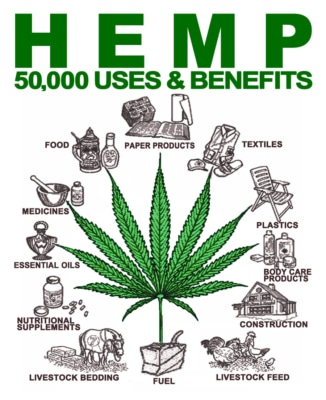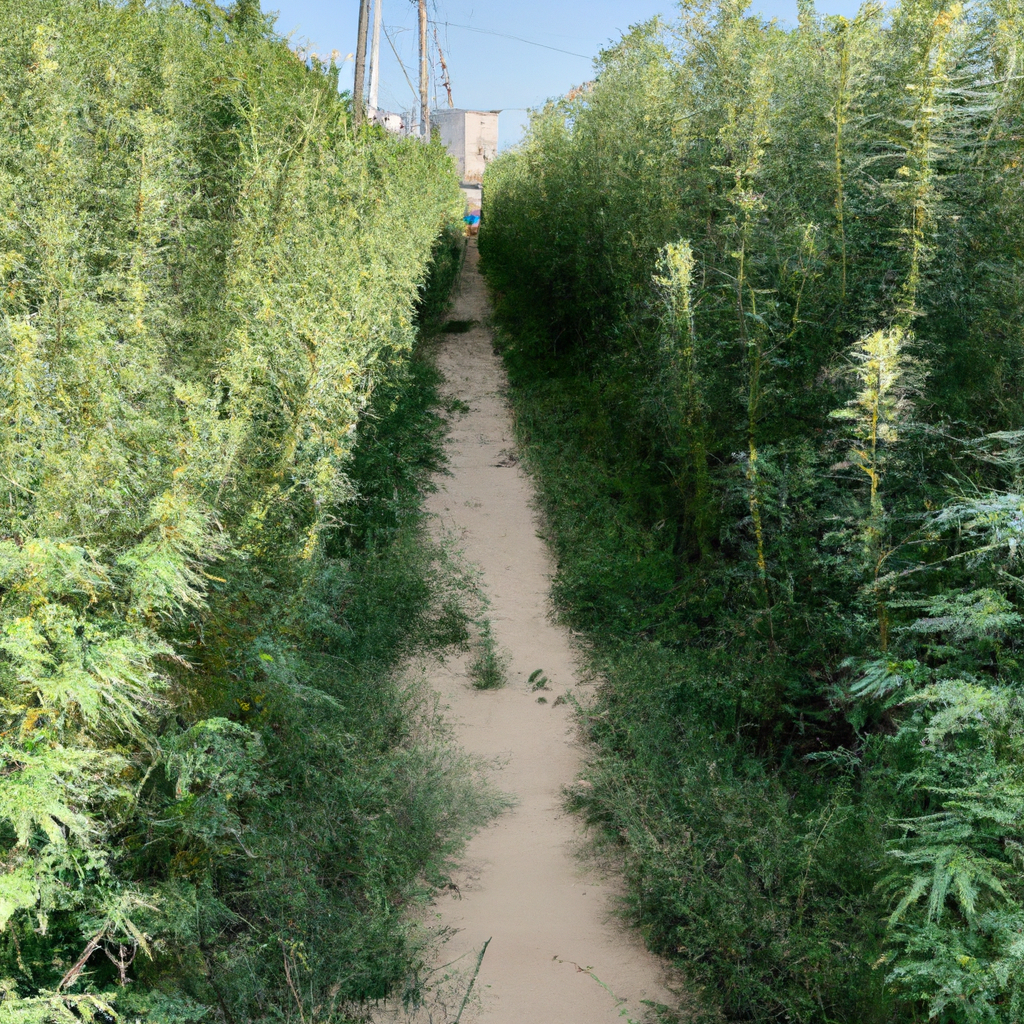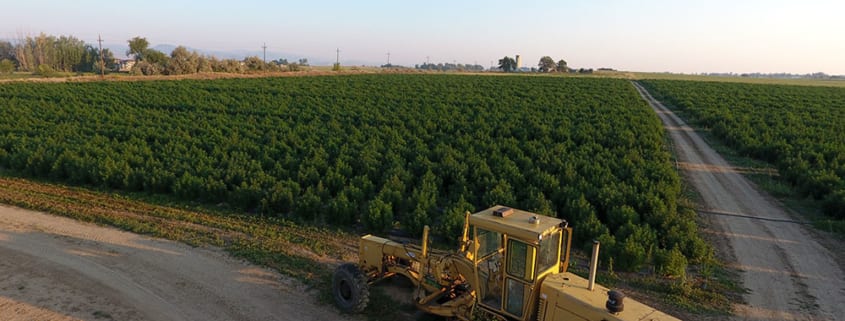So, you want to start an industrial hemp farm—good choice! The 2018 Farm Bill finally made industrial hemp farming legal in the United States. The passage of the bill set off a bonanza of hemp farming, fed by the rabid popularity of CBD oil and the recent, growing interest in CBG oil. According to a market research report, the industrial hemp market could be worth up to $26.6 billion in the United States by 2025. That’s all to say that hemp may be a highly lucrative crop for farmers.
If you’re wondering how to start a hemp farm, you have a lot to learn before you plant your first seed. While tales of huge hemp profits are certainly alluring, farmers must make sure they fully understand the hemp market, the regulatory landscape of hemp, and the agricultural requirements of this unique crop before starting a hemp farm. Fortunately, we are here to help. We’ve been working with farmers for years to help them earn the most from their hemp crop. Consider this your guide to hemp farming 101.
STEP 1: DO YOUR HOMEWORK
Planting a new crop is exciting, and you may be itching to start buying seeds, especially if the planting window is quickly closing for the season. Resist the urge to rush into a new endeavor, especially one as complicated as growing hemp. Instead, be patient and do your homework.
Learn everything you can about growing hemp and your state and local hemp regulations: Perform research online and speak with local farmers in your state who own hemp farms. Here are some of our favorite online resources for hemp farmers:
Additionally, check to see if your state has a hemp grower’s association you can join. This could be an excellent avenue to network with other local hemp farmers.
STEP 2: CLARIFY YOUR INDUSTRIAL HEMP GOALS
It’s best to start out with your goal in mind, then work your way backwards. Begin thinking about which hemp products you want to grow. For most hemp farmers, their hemp crop of choice is CBD oil, but some farmers choose to grow hemp for seeds or fiber.
STEP 3: BEGIN IDENTIFYING POTENTIAL CUSTOMERS
Ideally, you’ll want to have customers lined up before you harvest your hemp crop so you have a fast and easy way to unload your harvest. Unlike with corn and grain, there are no hemp silos where you can drop off your hemp after harvest.
Finding customers early can also help you decide which strains of hemp seeds you should purchase. For example, if you find a CBD manufacturer who wants smokable hemp flowers (also called buds) with a specific terpene profile (the aromatic quality of the flower), you can search out hemp seeds to meet that need. You may also find customers who want a CBG oil supplier—that could easily be you.
STEP 4: CREATE YOUR HEMP FARM BUSINESS PLAN
Yes, you knew this one was coming. Drafting a business plan is challenging, but to help inspire yourself, think of your business plan as a “proof of concept” test. It’s far better to discover problems while in the planning stage of your hemp farm than out in the field when you’ve already laid down a big investment.
Make sure your business plan includes important sections like:
- A SWOT ( Strengths, Weaknesses, Opportunities, and Threats) analysis
- Local hemp market overview
- Your sales strategy
- Your operating plan
- Your farm’s organizational structure
- Your financial plan, including a funding analysis and profit & loss forecast
We strongly suggest that you keep your profit estimates modest. Many online articles like to tell stories of farmers clearing $40,000 or more per acre of hemp. While these profits may be attainable by some, it is unlikely that first-time hemp farmers will see this level of return. By keeping your profit estimates reasonable, you can ensure that you’ll be able to meet your expenses. And if you beat expectations? Icing on the cake.
If you are having trouble developing your hemp farm business plan, reach out to your local hemp farmer’s association if one exists. You may also want to work with an agronomist who has experience in hemp farming.
STEP 5: DEVELOP A PLAN FOR TESTING AND COMPLIANCE
One of the unique challenges of starting a hemp farm is that farmers must abide by the USDA’s strict guidelines regarding the THC content of their crop. According to these guidelines, your hemp plants must stay below a 0.3% THC threshold. You will be responsible for frequently testing your plants to ensure compliance, which is regulated by your state.
We recommend that you begin testing your plants a month after germination and test every two weeks. You may want to test even more frequently as you get closer to harvest. Search for a reputable testing facility now so that you can ensure that you’ll be able to consistently and accurately test your plants.
STEP 6: CREATE AN IRRIGATION PLAN
Hemp can thrive with a variety of irrigation systems, including surface drip irrigation, subsurface irrigation, pivot irrigation, and flood irrigation. Now is the time to decide what type of irrigation system you want to use, as it will affect your overall costs, especially if you need to purchase a new system.
STEP 7: GET YOUR LICENSE/PERMIT/REGISTRATION
The 2018 Farm Bill requires that every state create and submit a “state hemp plan,” which includes information on how the state will actively track industrial hemp farming within its borders. That means each state has its own regulations regarding hemp farming.
You will almost certainly need to request some form of license or permit in order to farm hemp in your state. You may also need to register with your local city or county. Reach out to your state’s agricultural department to determine what type of permissions you need. You may also want to hire an attorney with industrial hemp experience to make sure all of your paperwork is above reproach.
STEP 8: INVEST IN EQUIPMENT AND LABOR
What new equipment will you need to ensure the best outcome for your hemp crop? For example, if you plan on buying hemp seeds, we strongly recommend that you start them in a greenhouse. (Don’t have a greenhouse? Try hemp starts instead of seeds.)
Hemp is also a labor-intensive crop, so it’s a good idea to recruit a crew of experienced workers who can help you cull male plants, watch out for pests, and maintain ideal field conditions. We recommend checking your fields daily.
STEP 9: PREP YOUR FIELDS
As the day to plant your first hemp crop grows closer, you’ll want to make sure your soil is in ideal condition to help your plants grow fast and strong. The best way to prep your field will depend on your farm’s soil conditions and your regional environment.
It’s a good idea to test your soil for elemental sulfur, potassium sulfate, and rock phosphate to make sure the levels aren’t too high. You’ll also want to make sure your soil is well-drained before planting.
STEP 10: BUY YOUR HEMP SEEDS
With everything in place and planned out, it’s time to purchase your seeds. If you’ve performed steps two and three, then you should know exactly what type of hemp crop you want to cultivate. For example, perhaps you want to grow hemp specifically for CBG production or maybe you want to grow hemp with a fruity terpene profile.
Decide whether you want to invest in hemp seeds or hemp starts. (We don’t recommend using hemp clones since they will never grow a taproot, which make the plants more fragile.) You may also want to consider purchasing early finishing seeds, which will allow you to stagger your harvest and use your labor more efficiently.
Look for a hemp seed company that has been around for at least a few years and is passionate about the genetics of their seeds. We strongly recommend that hemp farmers invest a little more upfront and purchase feminized seeds to ensure the highest resin yields possible. When male hemp plants pollinate females, resin yields are substantially lower. (Here’s everything you need to know about feminized hemp seeds.)
Finally, if you find a hemp seed strain you want to try, purchase your seeds from the original company that created that hemp strain, not a seed reseller. The original company will be able to provide you with much more information and personal guidance during the planting, cultivating, and harvesting process.
At High Grade Hemp Seed, we are here to help you as you prepare to start farming hemp. We would be glad to tell you more about our many tried and proven hemp seed strains, including industry favorite Berry Blossom, Cherry Wine, fast-growing Auto Flower, and one of our newest strains, Matterhorn CBG, bred specifically to increase CBG production.
Contact us today—we’ll be happy to help you learn more about how to start a hemp farm.
Link




